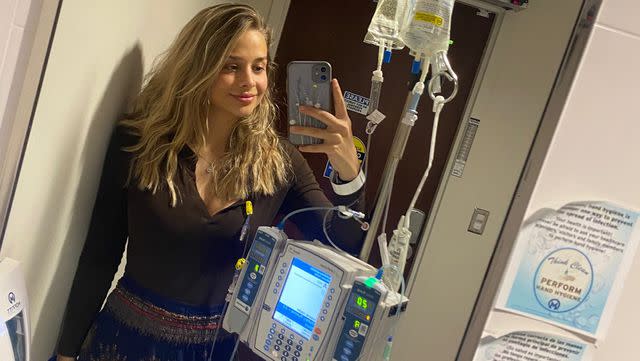Florida Nurse, 25, Who Couldn't Stop Burping Learned She Had a Symptom of Stage 3 Cancer
“I never thought it could be linked to such a horrible disease,” said Bailey McBreen

A Florida nurse is "devastated" after learning that her nonstop burping was actually a symptom of cancer.
In an interview with NeedToKnow, Bailey McBreen — from Tampa, Florida — recalled the strange moment she started burping frequently starting in 2021.
"I would burp five to 10 times a day," she told the outlet. "This was not normal for me. I actually rarely ever burped before, and that is why I noticed how weird it was."
The 25-year-old said she "didn't think too much" of it and brushed it off. However, by February 2022, she started suffering from acid reflux, which medics dismissed as a symptom of her anxiety.
McBreen explained that her health started deteriorating at the beginning of this year, dealing with "excruciating" pain, a loss of appetite and an inability to go to the bathroom.
As a nurse, she trusted her instincts that she had some sort of "obstruction" and quickly went to the hospital. A CT scan later revealed that she had stage 3 colon cancer and a tumor obstructing her large intestine. She admitted that she was shocked that her excessive burping led to such a life-changing diagnosis.
"I never thought it could be linked to such a horrible disease," she said.
"It truly was an out-of-body experience," McBreen added of her diagnosis. "I remember the first thing I could say was, 'I am not ready to die.' Never in a million years did I think that any vague symptom I had was actually stage 3 colon cancer."
Related: Kirstie Alley's Colon Cancer Was Diagnosed Not Long Before Her Death — What Women Should Know

Related: Chadwick Boseman Was 43 When He Died of Colon Cancer — and Cases in Young Adults Are Rising
McBreen told the outlet that believes the nonstop burping was linked to gastroesophageal reflux disease, which began a month after noticing the burping. Gastroesophageal reflux disease (GERD) occurs when stomach acid repeatedly flows back into the tube connecting your mouth and stomach (esophagus), according to the Mayo Clinic.
"Excessive burping isn't your textbook sign of colon cancer — but my oncologist told me that it was likely the start of my symptoms," she added. "GERD was a symptom in my case because my tumor was slowly causing a complete bowel obstruction."
Following her diagnosis, McBreen — who has always lived a healthy and active lifestyle — had emergency surgery to remove the tumor in January before starting chemotherapy that will continue through August, sharing updates on her GoFundMe page.
She urged others to listen to their bodies and stay on top of their health if they notice anything out of the ordinary.
"The 10 months leading up to my diagnosis, I was actually the healthiest I had ever been," she said. "I worked out 5to 6 times a week consistently for at least 14 months. Cancer does not discriminate."
"Anything that is new to you, even if it's otherwise considered a normal thing, needs to be addressed," McBreen continued. "I didn't think anything of my burping, because it was a 'normal' thing. It's important to listen to your body."
Related: Randy Gonzalez, Dad of TikTok Duo Enkyboys, Dies of Colon Cancer at 35
Related: Taylor Dayne Reveals 'Dark' Battle with Colon Cancer: 'This Has Challenged Me Mentally, Emotionally'
Colon, or colorectal, cancer is the third most common cancer in the world, after lung and breast cancers.
McBreen was diagnosed with colon cancer at 24 — well before the recommended age for screenings and a reminder of how colon cancer is on the rise in young people. Most notably, Chadwick Boseman was diagnosed with stage 3 colon cancer in 2016, when he turned 40 years old, before his death in 2020 at 43.
While approximately 90% of colon cancer cases occur in people over the age of 50, since the mid-90s, the number of new cases has been increasing among adults under 50 years old, according to Fight CRC — a national colorectal cancer advocacy organization that raises awareness about the importance of early detection through screening.
But people with colon cancer fare better when the disease is caught and treated early, before it spreads outside the large intestine or rectum.
Researchers aren't yet sure why adults are developing colon cancer at younger ages. Around 25% of patients have a family history of the cancer, and doctors are urging everyone to check into their backgrounds to see if they are at a higher risk. But diet, and its contributions to obesity, may be a cause.
The American Cancer Society recommends that adults 45 and up get regular colon cancer screenings, either stool analyses or colonoscopies. And they urge people with symptoms of colon cancer — such as a change in bowel movements, like increased diarrhea; rectal bleeding; dark stools; unexpected weight loss; cramping and excess fatigue — to get checked out by a doctor.
However, they emphasize the need for preemptive screenings, as these symptoms typically only appear after colon cancer has already spread.
For more People news, make sure to sign up for our newsletter!
Read the original article on People.

